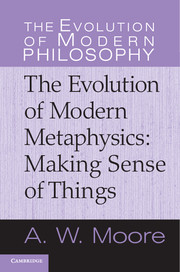Book contents
- Frontmatter
- Contents
- Preface
- Introduction
- Part One The Early Modern Period
- Part Two The Late Modern Period I
- Chapter 8 Frege
- Chapter 9 The Early Wittgenstein
- Chapter 10 The Later Wittgenstein
- Chapter 11 Carnap
- Chapter 12 Quine
- Chapter 13 Lewis
- Chapter 14 Dummett
- Part Three The Late Modern Period II
- Bibliography
- Index
Chapter 8 - Frege
Sense Under Scrutiny
from Part Two - The Late Modern Period I
Published online by Cambridge University Press: 05 June 2012
- Frontmatter
- Contents
- Preface
- Introduction
- Part One The Early Modern Period
- Part Two The Late Modern Period I
- Chapter 8 Frege
- Chapter 9 The Early Wittgenstein
- Chapter 10 The Later Wittgenstein
- Chapter 11 Carnap
- Chapter 12 Quine
- Chapter 13 Lewis
- Chapter 14 Dummett
- Part Three The Late Modern Period II
- Bibliography
- Index
Summary
What Is Frege Doing Here?
Gottlob Frege (1848–1925) was by common consent the greatest logician of all time. He founded the discipline of formal logic, in its contemporary guise. In this he made the first and most significant advance in the study of logic since Aristotle, an advance that was certainly significant enough to belie Kant’s famous declaration that ‘since the time of Aristotle’ logic ‘has … been unable to take a single step forward, and therefore seems to all appearance to be finished and complete’ (Kant (1998), B viii). Frege was also a brilliant philosopher of mathematics. But he was not a metaphysician, not really. Nor was he a meta-metaphysician: he had no special interest in the nature, scope, or limits of metaphysics. I need to begin this chapter by saying something about why it is included at all.
Part Two of this book is concerned with the analytic tradition in philosophy. There is no clear agreement about how to characterize this tradition. But since on any account one of its principal aims is clarity of understanding and one of the principal means whereby it pursues this aim is the analysis of language, Frege cannot fail to count as a supremely important contributor both to its inception and to its propagation. This is not least because contemporary formal logic provides the single most powerful set of tools that analytic philosophers use in undertaking such analysis. But furthermore it was Frege who demonstrated how this kind of close attention to language could play a crucial role in addressing philosophical problems.
- Type
- Chapter
- Information
- The Evolution of Modern MetaphysicsMaking Sense of Things, pp. 195 - 221Publisher: Cambridge University PressPrint publication year: 2011

